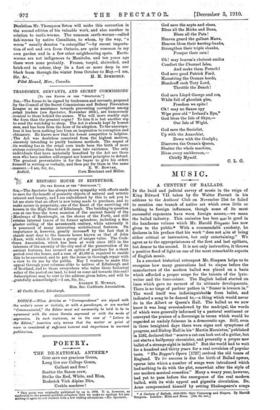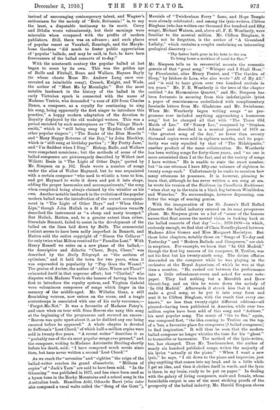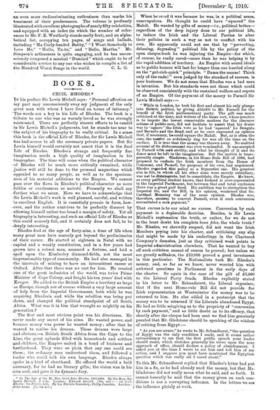MUSIC.
A CENTURY OF BALLADS.
IN the lucid and judicial survey of music in the reign of King Edward VII. taken by Sir Walter Parrott in his address to the Authors' Club on November 21st he failed to mention one branch of native art which owes little or nothing to foreign influences, though some of its most successful exponents have worn foreign names,—we mean the ballad industry. This omission has bees raacle good in the handsome volume which Mr. Harold Sinpsont has now given to the public.* With a eommendabh raodesty, he declares in his preface that his work "does not aim at being either critical or instructive, but only entertaining." We agree as to the appropriateness of the first and last epithets, but demur to the second. It is not only instructive, it throws a positive flood of light on one of the most remarkable aspects of English music.
In a succinct historical retrospeot Mr. Simpson helps us to recognise how many generations had to elapse before the manufacture of the modern ballad was placed on a basis which afforded a proper scope for the talents of the lyric- writer and the tune-coiner. The English ballad started on lines which gave no earnest of its ultimate developments. There is no tinge of parlour pathos in "Sumer is icumen. in." The word itself was indistinguishable from ballet, and indicated a song to be danced to,—a thing which would never do in the Albert or Queen's Hall. The ballad as we now know it was long overshadowed by the madrigal, the words of which were generally informed by a pastoral sentiment or conveyed the praises of a Sovereign in terms which would be regarded as unduly fulsome in a democratic age. Still, even in those benighted days there were signs and symptoms of progress, and Bishop Hall in his " Martin Marsixtus," published in 1592, declared that "scarce a cat can look out of a gutter, but out starts a halfpenny chronicler, and presently a proper new ballet of a strange sight is indited." But the world had to wait for a hundred and thirty years for a real revulsion of popular taste. "The Beggar's Opera [1727] revived the old tunes of England. To its success is due the birth of Ballad operas, operas into which a number of songs were introdneed which had nothing to do with the plot, somewhat after the style of our modern musical comedies." Many a weary year, however, had yet to pass before the emergence of the real modern ballad, with its wide appeal and gigantio circulation. Dr. Arne compromised himself by setting Shakespeare's songs • A Century of Ballads, 1810-1910e their Composite and Singers., By Harola Simpson. London Mills and Boon. [10s. 6d. net.]
instead of encouraging contemporary talent and Wagner's enthusiasm for the melody of "Rule, Britannia!" is, to say the least, a disputable testimony to its merit. Carey and Dibdin wrote voluminously, but their earnings were miserable when compared with the profits of modern publishers. Still, there was an advance ; and such places of popular resort as Vauxhall, Ranelagh, and the Maryle- bone Gardens "did much to foster public appreciation of 'popular' ballads, and may be said, in fact, to have been forerunners of the ballad concerts of to-day."
With the nineteenth century -the popular ballad at last began to come by its own. This was the golden age of Balfe and Fitzball, BlU111 and Wallace, Haynes Bayly (to whose chaste fuse Mr. Andrew Lang once con- secrated an inimitable essay), Crouch, Knight, and Wade, the author of "Meet Me by Moonlight." But the most notable landmark in the history of the ballad in the early Victorian epoch is connected with the name of Madame Vestris, who demanded "a sum- of 220 from Charles Dance, a composer, as a royalty for continuing to sing his song, being apparently the first singer to introduce this practice," a happy modern adaptation of the devotion to Royalty displayed by the old madrigal writers. This was a period enriched by such masterpieces as "The Village Black- smith," which is "still being sung by Hayden Coffin and other popular singers "; "The Banks of the Blue Moselle" and "Many Happy Returns of the Day," by John Blockley, which is "still sung at birthday parties"; "My Pretty Jane," and "I'm Saddest when I Sing." Bishop, Balfe, and Wallace were competent musicians ; but the methods of some of the ballad composers are picturesquely described by Willett (not Willett) Beale in "The Light of Other Days," quoted by Mr. Simpson on p. 102. Beale wrote a number of songs under the alias of Walter Maynard, but he was acquainted with a certain composer "who used to whistle a tune to him, and get Maynard to write it down and put it into shape, adding the proper harmonies and accompaniments," the song when completed being always claimed by the whistler as his own. Another notable landmark in the evolution of the popular modern ballad was the introduction of the cornet accompani- ment in "The Light of Other Days" and "When Other Lips," though John Mullah in a fit of ungracious veracity described the instrument as "a cheap and nasty trumpet." But Hullah, Hatton, and, to a greater extent than either, Sterndale Bennett, failed to assist in the development of the ballad on the lines laid down by Balfe. The commercial i satinet seems to have been sadly imperfect in Bennett, and Hatton sold the entire copyright of "Simon the Cellarer " for only twice what Milton received for" Paradise Lost." With Henry Russell we enter on a new phase of the ballad,— the descriptive and didactic "Cheer, Boys, Cheer," was described by the Daily Telegraph as "the anthem of optimism," and it held the town for two years, when it was superseded in popularity by "Pop Goes the Weasel." The genius of Ascher, the author of "Alice, Where art Thoa?" exhausted itself in that supreme effort; but " Claribel," who disputes with Madame Vestris the honour of having been the first to introduce the royalty system, and Virginia Gabriel were voluminous composers of songs which linger in the memory of the middle-aged. Mr. Wilhelm Ganz, a still flourishing veteran, now enters on the scene, and a tragic contretemps is associated with one of his early successes,— ' Forget-Me-Not." It was a favourite of Madame Patey's, and once when on tour with Sims Reeves she sang this song at the beginning of the programme and secured an encore : "Reeves was quite upset about it, as he disliked any one being encored before he appeared." A whole chapter is devoted to Sullivan's "Lost Chord," of which half-a-million copies were sold in twenty-five years. "A recent writer" describes it as "probably one of the six most popular songs ever penned," and the composer, writing to Madame Antoinette Sterling shortly before his death, said : "I have composed much music since then, but haw never written a second 'Lost Chord.'"
As we reach the" seventies "and" eighties" the reign of the ballad-writer reaches its grand elimacteric. "Millions of copies" of "Jack's Yarn" are said to have been sold. "In the Gloaming" was published in 1877, and has since been used as a hymn tune in the Rocky Mountains and a school song in the Australian bush. Hamilton Aide, Odoardo Barn i (who inter alma composed a vocal waltz called the "Song of the Gout "), ltfarzials of " Twickenham Ferry" fame, and Hope Temple were already celebrated ; and among the lyric-writers. Cliftoti Bingham (who has written one thousand five hundred and fifty, songs), Michael Watson, and, above all, F. R Weatherly, were, familiar familiar to the musical million. Mr. Clifton Bingham; it must not be forgotten, is the author of "A Greenland Lullaby," which contains a couplet enshrining an interesting geological discovery :— "Thy father hath gone in his boat to the sea To bring home a necklace of coral for thee."
Mr. Simpson tells us in reverential accents the romantics genesis of that "great song," "Whisper and I Shall Hear," I by Piccolomini, alias Henry Pontet, and 'The Garden of , Sleep," by Isidore de Lara, who also wrote "All of My
and "is said to haye given over two hundred recitals in ten years." Mr. F. E. Weatherly is the hero of the chapter entitled "An Harmonious Quartet," and Mr. Simpson has been fortunate in securing from this indefatigable. lyrist a paper of reminiscences embellished with complimentary facsimile letters from Mr. Gladstone and Mr. Swinburne, When Mr. Weatherly began writing songs "no pro- gramme ever included anything approaching a humorous. song," but he changed all that with "The Three Old, Maids of Lee." Of "Nancy Lee," composed by "Stephen. Adams" and described in a musical journal of 1878 as.. "the greatest song of the day," no fewer than seventy. thousand copies were sold in eighteen months, and its poPu- larity was only equalled by that of 'The Midshipmite," anether product of the same collaboration. Mr. Weatherly has been writing songs for forty-three years, and "no one is. more astonished than I at the fact, and at the variety of songi I have written." He is unable to state the exact number.': but "in one ottoman I have fifty-one volumes of eighteen to- twenty songs each." Unfortunately be omits to mention IloW many ottomans he possesses. It is. however, pleasing ' learn that, although be has never written a sea song at ties, he wrote his version of the Siciliana (in Cavetlleria Rasticana) "when shut up in the train in a black fog between Winshledon, and Waterloo." No surroundings, however depressing, can fetter the wings of soaring genius.
With the inauguration of the St. James's Hall Ballad.. Concerts the ballad industry entered on its most prosperous phase. Mr. Simpson gives us a list of "some of the famous names that float across the mental vision in looking back at the ballad concerts of that day "—i.e., 1870-1890—in which, curiously enough, we find that of Clara Novell° placed between Madame Alice Gomez and Miss Margaret Macintyre. Bnt these later chapters, notably those on " Songs of To-day and,. Yesterday" and "Modern Ballads and Composers," are rich in surprises. For example, we learn that "In Old Madrid," though the first big success of its composer, H. Trotere, was not his first but his twenty-ninth song. The divine, afflatus descended on the composer while he was playing in the orchestra at the Royal Aquarium, of which he was at thyt time a member. "He rushed out between the perfornsanee. into a little refreshment-room and asked for some note-
paper. They had nothing but a Meredith and Thew, biscuit-bag, and on this lie wrote down the melody, of 'In Old Madrid.' Afterwards it struck him that it would_ make a good song, so he put it into song form and sent it to Clifton Bingham, with the result that every one- knows," no less than twenty-eight different editions—all pirated—having been published in America, while over two million copies have been sold of this song and "Astliore," his next popular song. The music of "Go to Sea," again,. was composed first, "the idea coming to Trotere on the top, of a 'bus, a favourite place for composers [? ballad composers-I' to find inspiration." It will thus be seen that the modern ballad composer no longer whistles the tune for his " ghost " to transcribe or harmonise. The method of the lyric-writer, too, has changed. Thus Mr. Teschemacher, the author of nearly six hundred published songs, writes the majority of his lyrics "actually at the piano." "When I want a new lyric," he says, "I sit down to the piano and improvise, just play anything that comes into my head, and in a little while I get an idea, and then it clothes itself in words, and the lyric is there, in my brain, ready to be put on paper." In dealing With the galaxy of living composers, male and female, whose formidable output is one of the most striking proofs of the prosperity of the ballad industry, Mr. Harold Simpson shows an even more undiscriminating enthusiasm than marks his -treatment of their predecessors. The volume is profusely illustrated with excellent photographs of nearly fifty celebrities, and equipped with an index (in which the number of refer- *noes to Mr. F. E. Weatherly stands easily first), and an alpha- betical list, occupying ten pages, of songs and ballads, including "Ma Curly-headed Babby," "I Want Somebody to Love Me," "ilnIlo, Tu-tu," and "Hello, Martha." - Mr. Simpson's artlessness is quite engaging, and he has uncon- sciously composed a musical "Dunciad" which ought to be of considerable service to any one who wishes to compile a list of
the Hundred Worst Songs in the world. C. L. G.












































































 Previous page
Previous page